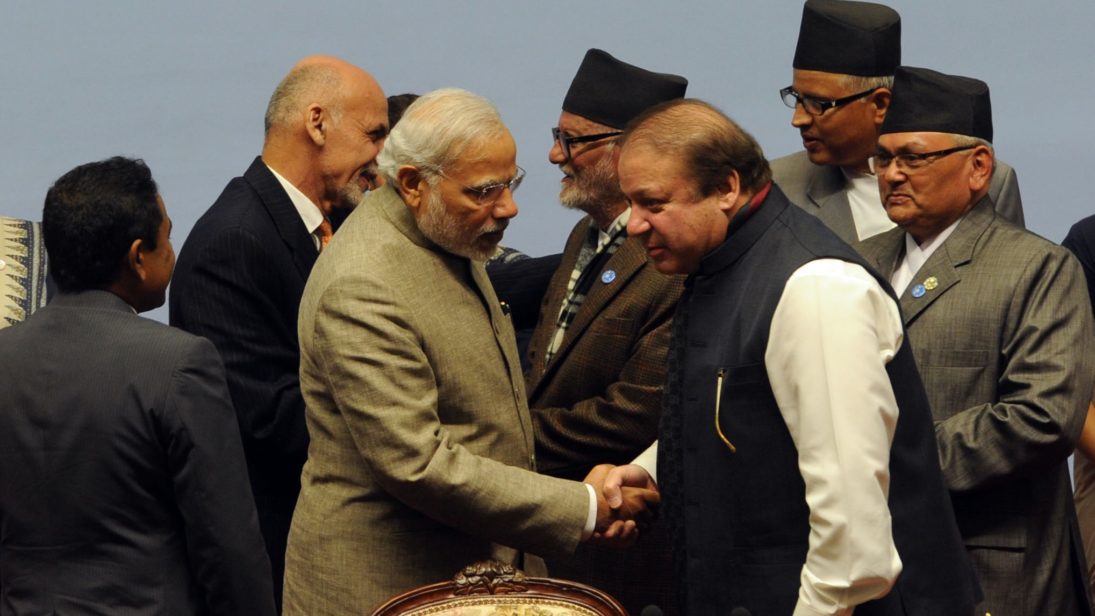
Narendra Modi’s move of inviting leaders of SAARC countries, including Pakistan Prime Minister Nawaz Sharif, and acceptance of the same by Nawaz Sharif, are positive developments. Modi’s move is all the more encouraging because during the election campaign he used some shrill rhetoric against Pakistan.
The heads of state of Afghanistan, Hamid Karzai, Sri Lanka, Mahendra Rajapaksa, and Bhutan Prime Minister Tshering Tobgay, Nepal Prime Minister Sushil Koirala, and Maldivian President Abdulla Yameen Abdul Gayoom were quick to accept Modi’s invite. Bangladesh will be represented by its speaker Shirin Chaudhry, while Sharif gave his assent on Saturday. Only one Non-SAARC country, Mauritius, will be represented by its President Navin Ramgoolam. It has been argued by certain analysts in India, that while Modi’s move may enhance his image, he did put Sharif in an awkward position especially vis-à-vis the Jehadis and the Pakistan army.
There is no doubt that such goodwill gestures are necessary for at least sending an unequivocal message that India cares about SAARC, even if there are no immediate benefits. Yet, it would be fair not to read too much into the invite sent out by Narendra Modi. Risk averse diplomats in the Indian establishment need to realize that an element of spontaneity is essential for diplomacy in South Asia, and magnanimity by India does not necessarily imply that India is ‘surrendering’ to any of its neighbours including Islamabad.
Yet, Modi supporters or those expecting a sudden turn-around in ties with the outside world, especially Pakistan, with a new government at the helm need to be a bit realistic. Many have already begun to argue that due to his right wing background, Modi may be in a better position to make concessions to Pakistan, and to improve ties between New Delhi and Islamabad.
It would be pertinent to point out that while Modi may have more space in dealing with Pakistan than his predecessor Dr Singh, given the numbers his party has in parliament, his firm grip over his party, and his hardline image, he cannot afford to make any major concessions until there is some progress on trials of 26/11 suspects, as well as action against Hafiz Saeed. The Congress party which got trounced in the recent elections is likely to keep the pressure on the BJP, given that Modi accused the erstwhile Congress-led United Progressive Alliance of following an excessively weak Pakistan policy. Apart from this, Modi’s first priority is getting India’s economy back on track. Until that happens he is not in a position to make significant breakthroughs on big ticket items.
Similarly, Sharif too may have made it abundantly clear that he is all for peace between both countries, yet there are lobbies inimical to peace, which includes not just hardliners within the establishment but also the Pakistan Army. The delay in accepting Modi’s invite has already been linked to the fact that many within the Pakistan army were against Sharif’s attendance.
The attack on India’s consulate in Afghanistan’s Heart Province, on Friday May 24, has been linked to Modi’s invite to Sharif, and a message from the Pakistan Army to the Sharif government, that the former still remains the boss, especially when it comes to relations with India. Sharif, a third time Prime Minister who had a bitter experience in 1999 needs to be cautious, even though democracy seems to have strengthened in the country since the earlier PPP regime completed its full term, and 2013 witnessed the first smooth democratic transition in the country.
If there are areas where Modi may find it easier to engage with Pakistan, then it is certainly in the sphere of trade and commerce, given that his main plank during the election was uplifting of the Indian economy and also that the cornerstone of his foreign policy is trade and commerce. Sharif too has a business mind and has been advocating closer economic ties between both countries, this just may be the golden opportunity.
In conclusion, it is important to be realistic in our expectations, and while both countries may be able to make progress in trade and commerce and people to people contact, it is important to have realistic expectations.
***